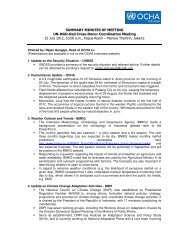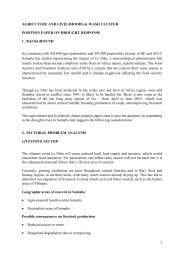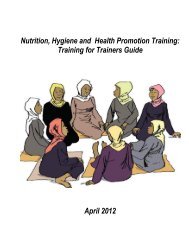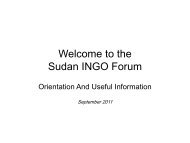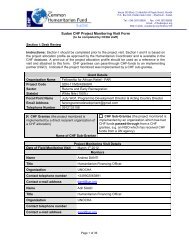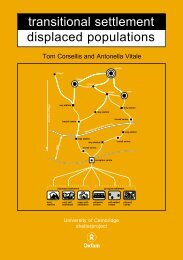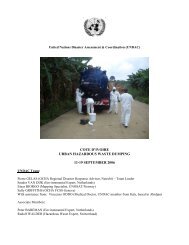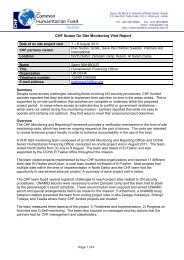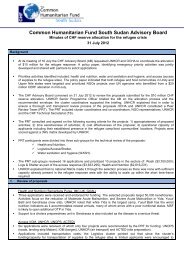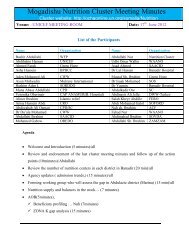Shelter - NFI SPHERE - OCHANet
Shelter - NFI SPHERE - OCHANet
Shelter - NFI SPHERE - OCHANet
You also want an ePaper? Increase the reach of your titles
YUMPU automatically turns print PDFs into web optimized ePapers that Google loves.
Minimum Standards in <strong>Shelter</strong>, Settlement and Non-Food Items<br />
● The procurement of materials and labour and the supervision of the<br />
construction process are transparent, accountable and in accordance<br />
with internationally accepted bidding, purchasing and construction<br />
administration practices (see guidance note 6).<br />
Guidance notes<br />
1. Sourcing of shelter materials and labour: livelihood support should be<br />
promoted through the local procurement of building materials, specialist<br />
building skills and manual labour. Multiple sources, alternative materials<br />
and production processes, or the provision of regionally or internationally<br />
sourced materials or proprietary shelter systems are required if the local<br />
harvesting and supply of materials is likely to have a significant adverse<br />
impact on the local economy or the environment. The re-use of materials<br />
salvaged from damaged buildings should be promoted where feasible,<br />
either as primary construction materials (bricks or stone masonry, roof<br />
timber, roof tiles, etc.) or as secondary material (rubble for foundations or<br />
levelling roads, etc.). Ownership of or the rights to such material should be<br />
identified and agreed (see <strong>Shelter</strong> and settlement standard 6, guidance<br />
note 3 on page 228).<br />
2. Participation of affected households: skills training programmes and<br />
apprenticeship schemes can maximise opportunities for participation<br />
during construction, particularly for individuals lacking the required building<br />
skills or experience. Complementary contributions from those less able to<br />
undertake physically or technically demanding tasks can include site<br />
monitoring and inventory control, the provision of child care or temporary<br />
accommodation and catering for those engaged in construction works, and<br />
administrative support. Consideration should be given to the other<br />
demands on the time and labour resources of the affected population. The<br />
inclusion of food-for-work initiatives can provide the necessary food security<br />
to enable affected households to actively participate. Single women,<br />
female-headed households and women with disabilities are particularly at<br />
risk from sexual exploitation in seeking assistance for the construction of<br />
their shelter. The provision of assistance from volunteer community labour<br />
teams or contracted labour could complement any beneficiary<br />
contributions (see Participation standard on page 28).<br />
<strong>Shelter</strong><br />
225



